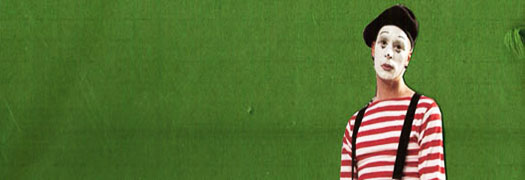
Features | Lists
By The Staff
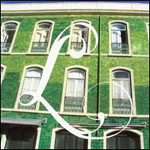
10 :: Keith Fullerton Whitman
Lisbon
(Kranky)
If there’s one thing that unifies the various stunned reactions to Lisbon, it’s an overarching agreement that Keith Fullerton Whitman’s music demands a new critical vocabulary. Some writers hit upon this specifically, their heads having knocked too relentlessly against the barrier between what we do and what he does, and putting forth an exasperated, “I don’t know, it’s amazing” in print; other critics, in trying to find an apt metaphor, merely inadvertently imply the inadequacy of our form. So to “blurb” this record—officially the “tenth best” record of 2006 but, for my chips, the most plainspoken and profound—is a futile exercise, because I know I’m fighting a losing battle. What, really, are my words worth?
There are superficial tags and descriptors I could apply. This is ambient music, composed of drones and sine waves; the music patters, shimmers, ruptures. It is a single 42-minute track, composed live in the titular township, and there are structural cues I could note, like when, twenty minutes in, the waves on top remain a constant speed while the burbles below expand like a blackening sky and stretch slow and thin, so that the juxtaposition effects us something like a Kubrickian camera pull does, disorienting and emphatic. After this the music, its waves thinning and spread, dematerializes, until it breaks into reality: we hear Whitman banging around equipment, setting up a 9-minute second act, a sort of denouement that repeats in grotesque miniature what occurred in the fantastic opening bloom.
But, see? You have no fucking idea what I’m talking about. Which is a shame, because if ever there was a token record that could nudge people outside established taste boundaries—indie pop, or trap-hop, or whatever—it’s Whitman’s. This is mind-expanding stuff in the least pretentious and most honest way, because the sheer beauty of this music demands a reevaluation of taste, of what it is that makes us put speakers in our ears and cars and bedrooms. And that term, beauty, that I just threw out unchecked up there, won’t be justified or qualified in this text, because that’s the fastest path toward inadequacy and irrelevancy. I can’t explain what makes this music beautiful; it just is.
A former teacher, who I hated dearly, had at least one idea I admired, even if his application of it involved mind-numbing intellectual circle-jerking. He talked about how there was nothing more beautiful than a state of absolute confusion, that point where discussing and thinking and writing about something ceased to make any sense or have any relevance to where the point started, where meaning was spread to a few dozen different layers and one could make theories that connected them, but they were trifling and incorrect things, and clawing the way back out of all that conjecture would be impossible, so the only solution was to keep digging, keep guessing, stay confused. That state, that moment of complete intellectual abandon, he said, was the only time he felt alive. He was a pretentious twit. But in the case of Keith Fullerton Whitman, I can’t help but find some truth to this. Lisbon infuriates me as a writer, but as a listener it mummifies and enthralls me, and in some way the disconnection between these two states spans pretty much everything I know enough to care about. This is confounding music, in other words, but it is alive.
Clayton Purdom
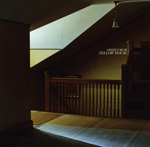
9 :: Grizzly Bear
Yellow House
(Warp)
My personal pick for album of the year, Grizzly Bear was outright in obliterating my landscape, dropped like napalm on my unassuming ears, incinerating every nearby promo from sight and older album from memory. Even my beloved Talking Heads were temporarily becoming flimsy, two-dimensional cutouts of their former selves in the days immediately following the epic Yellow House’s arrival. But for me its appeal is a guttural, instinctual one: almost everything about this album’s enormous sounds, about its symphonic scale, is difficult to adequately describe in writing. Just ask the other CMGers: I wouldn’t shut up about it, probably didn’t make any sense jabbering through all that enthusiasm, and was still too intimidated to review it myself. Yellow House can be so opaque in the depth of its details, yet so wordlessly moving that one is left with simply listing some of the many moments contained therein to leave them weak-kneed.
Like the cacophonous drum entry two thirds of the way through “Lullabye,” with its mellifluous bass drum stomp and the way it perfectly builds to a multilayered wall of vocal melodies and descending flute samples. Or the five headed destroyer of “Central and Remote,” which uses its toms and Beach Boys-gone-serpentine backups to stand giant and impassable. Or Yellow House’s more spacious aspects, when it asks listeners to spend time with a single, impeccably produced acoustic guitar tone, or the way a voice incubates from a thin wisp to part of a collective suddenly teeming with seemingly innumerable members. How the innocuous picking of opener “Easier” in no way implies the gorgeous blossom of sound that almost immediately follows it. The way “Colorado” has about seven songs worth of melodies in it. “Knife,” in its entirety. These are signs of more than a good album. They’re the indication of a special effort, unique, impossible to duplicate for the complexity of its mythological impressions. Yellow House simply reminds me of listening to deep, classic rock staples, your Rumors (1977), All Things Must Pass (1970) or Aja (1977), albums that help to define the records around them by association while sometimes, if the moment is right, seeming timeless. Months and months after first hearing it, I still feel like comparing anything else from this year to Yellow House is like comparing a casual knife collector to King Arthur.
Fellow CMG writer David Greenwald said Yellow House sounded like “The Animal Collective doing SMiLE (2004)” — a pretty big statement, and one justifiably challenged by our ed in chief, the staff Beach Boys guru. I think pointing out that the sentiment is even there, that it’s even possible to discuss with sincerity and seriousness a newish band called Grizzly Bear from Brooklyn relative to whether or not their sophomore album is anything like Brian Wilson’s monolithic opus, may be one of the only things I can say to you to encourage, please, if only for minutes (and that may be all it will take), give yourself over to Yellow House.
Conrad Amenta
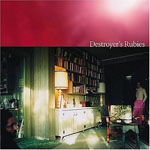
8 :: Destroyer
Destroyer's Rubies
(Merge)
Bejar already delivered the ultimate in self-reflexive meta albums with Your Blues (2003), and, while Rubies does self-mythologize in that same spidery way, the record also ditches Your Blues’ cloying synths for a tapestry of rusticated guitars and the instrumental equivalent of ruffled pages blowing over in the wind. And now, with a firm backing band in tow, Bejar sounds more assured than ever to expound on, say, Camus in song and to still make it all sound bold and fearless, fortifying the romantic, quixotic celebration of imagination. This celebration is the crown jewel of the record, appropriating the sleeve of Slanted and Enchanted (1992) for the piano cavalcade of “European Oils” or the uproarious, audacious nonchalance of battle-bereaved warrior’s anthem “Sick Priest Learns to Last Forever.” Bejar’s killer riffs (strange, I know) on the mammoth sprawl of the title-track and the lackadaisical shuffle “3000 Flowers” play a good foil to the subtler, but no less engaging, pleasures of “Painter in Your Pocket,” where the light, bouncy undulation of the music mirrors Bejar’s own artful voice, darting in and out of crescendos, false starts and deliberate bathos with the panache of a true maestro.
Alan Baban

7 :: Boris
Pink
(Southern Lord)
Thank God no one gives a shit about technicalities, because Pink would’ve been lost if we all pushed our glasses up, coughed, and said, “uh, no, this record was released in Japan in the last days of 2005, and the superior version is the limited-press double-gatefold vinyl, list price $89.99 US.” Not that I know anyone who would say such a thing (or who owns one of those records, because I would love to hear it), but Pink has to wind up on all lists somewhere. It tops mine, and I don’t consider myself all that much of a metal head. But this thing is too ferocious not to be held in its sway. For one thing, it retroactively makes the leviathan Akuma No Uta something like a dry-run, which is saying something. That moment where the proto shoegaze of opener “Farewell” (similar to the drone of “Introduction” from No Uta, but not quite since “Farewell” is untested water for the band) is blasted to bits by the thirty-second note mindfuck of “Pink” is, to me, the top sequencing choice of the year. There are a few critics who will point out that the album is their most “accessible” (true), that they’ve made better records (false), and that this is “high-fiving” music (well, true, but why on earth is that a problem?). Whatever: for all its streamlining, this is still resolutely shaggy, dirty, and fun-ass music that was never far from my CD player all year.
Christopher Alexander
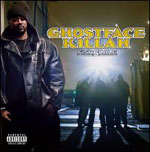
6 :: Ghostface Killah
Fishscale
(Def Jam)
Frothy year-end blurbs can still be a little conflicted, right? Because here I am writing about an album that’s knocking at the door of CMG’s top five albums of this fine year, and it’s just my fourth-and-a-half favorite Ghostface record (yes, I’m counting Cuban Linx as half a Tony Starks). That it’s charting so high on our list (and others) might be indicative of a few different things: the kind of year in rap it’s been; Ghostface’s burgeoning icon status with the indie crowd (for various reasons, but especially now that he’s BFF with MF Doom); or that only the Clipse album was more undeniable as far as 2006 hip-hop goes. Not that the quality of Fishscale is undeniable, necessarily, even if that’s part of it. Real talk: the thing’s a third filler, carelessly sequenced, features a single even more calculated than “Push,” ends with a Duets reject, and aside from “Shakey Dog” lacks unanimously approved standouts (shit, the first Theodore Unit album had a couple better bangers). But all of that’s an organic part of what is undeniable about Fishscale: its “Ghostfaceness” (thanks, Clay).
We’ve had most of the year to digest Fishscale, and maybe that’s been a little too long for some. I’ve seen a lot of people claiming that More Fish is equal or superior; to my ears that’s some honeymoon bullshit. While More has quite a few excellent tracks, it still plays out like a posse-heavy B-sides comp (with a better marketing scheme) — one that lets fucking Shawn Wigs hang out and doesn’t even have the decency to cough up lusted-after, Veloso-sampling “Charlie Brown.” But a little Ghostface goes a long way. When he’s bad (not even sure “bad” is a reality for him), he’s just drawing out what makes him great, and sometimes he’s all the more endearing for his questionable decisions (i.e. trying to sing, rapping over untouched soul standards, sharing track space with Brak from Space Ghost). Ghostface is why we’ll eat up every last measure of More Fish when we just had 24 pieces of Fishscale for dinner.
And, really, return to those scales and you’ll see a gleam that escapes easy recollection. I didn’t even realize how much I liked the sample behind the hook for “Be Easy” until the Red Giants made it the focus of their CMG Covers remake. Ghostface squints back through a dusty pane, a blurred lens, at the brief encounter of “Beauty Jackson” and the appreciated abuse of “Whip You with a Strap,” and what better music to elevate hip-hop nostalgia to its peak than a couple soul-tingling Dilla beats? The Doom collaborations are ridiculous: the year hasn’t seen a writing exercise more verbally and musically evocative than “Underwater” or a caustic street-brawler harder than “Clipse of Doom.” And “9 Milli Bros.” might be a second-rate Clan cut, but that doesn’t mean you shouldn’t be thanking God on high for it, lifting your W in praise. Through it all, Ghostfaceness prevails: show me a 2006 album with a funnier, more ebullient, more pronouncedly passionate rap performance at its core, and I’ll show you a liar.
Chet Betz
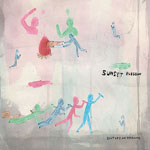
5 :: Sunset Rubdown
Shut Up I Am Dreaming
(Absolutely Kosher)
Last year Spencer Krug gave us an anthem; this year it’s a requiem. Apologies to the Queen Mary (2005), CMG’s retiring AOTY, was a brooding and bloody record, too beautiful to be punk but also too beautiful to be anything but. What separated it from the rest of last year’s crop was its refusal to shrug — a refusal, in fact, to do anything less than sprint breathlessly with furious leaps and bounds, fists clenched for a night of a million fights. “I’ll Believe in Anything” meant something; it was something to believe in, if anything.
But if Wolf Parade’s debut ended with something that may as well be called optimism (“This Heart’s on Fire”), the very title of Sunset Rubdown’s sophomore record offers a crushing reality check, a jab at cultural insularity. Shut Up I Am Dreaming opens with blooming blasts of guitar and synth, but the triumphant tone quickly reveals its sad smirk: “There’s a kid in there / And he’s big and dumb / And he’s kinda scared.” Just as Wolf Parade transcended genre and scene, releasing a call to arms in the form of an album, so Sunset Rubdown have compiled a record that, more than any other 2006 release, is a mirror of the large, strange year from which it came, a bleary record full of big and dumb and kinda scary music.
This is the sound of a released prisoner’s pupils dilating, full of awed guitar blooms, hallucinatory xylophones, canned vocals and arch organs that vamp with the certainty of a guilty conscience. The record wanders, unsure of locale or identity, mercurially dazzled and despondent; each song is a suite in itself, following a clear emotional (if not narrative) arc. “Us Ones in Between,” with its plodding pianos and pedantic whistling, grapples with its place in the immensity of things (“I saw the sun go down / Outside of Arkansas / And I saw the sun come up / Somewhere in Illinois”) before coming unglued and transcendent, wavering brightly upon the word “mother,” and dying on a dancing denouement. But though “Us Ones” finds comfort in maternity, it still confuses and perverts it, musing, “I’ve heard of creatures / Who eat their babies / I wonder if they stop to think about the taste.” This miasmic world is Krug’s bleak prognosis of ours, and he fills his winding way with snakes, imperious imps, alpha male centaurs and, beneath all, a faceless chorus, whistling at times, sighing at others.
Krug aligns himself with and speaks for this chorus, alluded to in “Us Ones” but also in the voiceless majorities of “They Took a Vote and Said No” and “The Empty Threats of Little Lord.” His lyrics, filled with conflicted, cyclical imagery, capture an everyman impotence, and his shifting, nebulous longings create give the album an overriding desperation. Just look at the title, really: Shut Up I Am Dreaming isn’t an anthem and it’s nothing to believe in, but it is real, it is substantive. And, paradoxically, it’s this crucial, weighty verisimilitude that keeps Krug’s statement buoyant and listenable. Anybody with a production budget can lead a Black Parade, but it takes an artist of singular pedigree to stand right within the scattered ranks of that parade and still resound. Krug does just that, and while Shut Up I Am Dreaming is a haunting, haunted record, too dense and morbid to bear at times, it’s also the only record that needed 2006 as much as 2006 needed it.
Clayton Purdom

4 :: Neko Case
Fox Confessor Brings the Flood
(Anti-)
When Case snowcaps the mountainous coda of “Maybe Sparrow” with the lines “Those who can not hear the words / Those who will not hear the words,” it’s hard not to think that she’s punctuating those phrases with middle-finger exclamation points directed at every bozo who thinks the only thing they can mention is her throat. Come on: Ukrainian mythology is fine and good, but each of the 42 dissected heads visible in the artwork is (literally) a detached larynx, and therefore this album has to be understood as text. And yeah, that’s a paradox — this album is actually like 523 paradoxes set to music — but decapitation is too: two ideas (body and mind) separated, which means Case gets to play prophet as she lets fox claws carve her into a human virgule.
As a narrator or character, she is the space between religion and atheism, the moment between arousal and insight, the sigh between life and death, the chronicler and chronicled. Fox Confessor might superficially let the trailer trash out with the bathwater, but what makes it so affecting (and what makes it better than Bejar) is that the characters live as we all live, always on cusps, always rejecting knowledge while searching for meaning. Each character allows their fear of death to scare them into giving away their life, and those stakes are chilling enough, but it’s the way that Case’s narrative voice passively accepts this ultimate paradox as a simple fact of human existence that is both incredibly depressing and precisely why Fox Confessor works. Try to cut off your own head: you won’t succeed (though you may well die), but what blood you do let will pool, coagulate, and harden. And this album sounds like that incredibly quiet process: the surface is hard and cold, but poke the scab and you’ll discover something unendingly dense.
Mark Abraham

3 :: Califone
Roots & Crowns
(Thrill Jockey)
Crybabies cry, we all make our parents sigh, and it’s very likely that at least one mater/vater Martin-hater (where “Martin” equals restraint) wondered, “what would an experimental Spector-produced post-The Beatles Beatles sound like?” It didn’t quite work out that way, and the spaces between the folds of increasingly estranged bedfellows were filled with cultural air quotes and erotemes until they let it be. Except, four decades later, Califone throws the cradlesnakes in the quicksand, paints a heron king blue, makes sounds in a room — all of this the roots and crowns — and we get to sink with out parents’ presuppositions, because here it is: sheer pop, sheer experimentalism, sheer sound. And, fine, the Beatles wanted to get back to their personal roots, but Califone has built their career on exhaustively making the roots and culture of everybody’s parents sigh exhaustedly, second only to Dust-to-Digital in reclaiming our decayed pasts.
The “gathering” motif is fine, I guess, but I don’t want to talk about rustic Americana. I mean, it’s easy to get caught in that throwback: I sometimes imagine Califone crafting this endlessly gorgeous album as schoolchildren fascinated with carving the notes into their desktops just because they like working the wood. But it can’t be that idyllic, because Joe Adamik, Jim Becker, Ben Massarella, and Tim Rutili are monsters, gathering and hunting, transitioning between thick acoustic pop, feedback, and tape loops like there’s no difference, but what’s even more shocking is that the skill with which they do all of this makes it seem necessary, obvious, and endlessly complicated, all at the same time. “Califone is truth,” Betz has asserted, and they are, because they aren’t an experimental band that tries to play pop, or a pop band experimenting. With Brian Deck manipulating the creases, they’ve always been both, combining the most adventurous experimental impulses with sheer pop accessibility, pinging everything from postpunk to modern electronica to some unknown ‘50s musician trying out their amp in different corners of the room just to judge the resonance. That’s the kind of discovery we’re talking about; every reversed guitar riff, every filtered drum loop, every wild shaft of noise that drills into the mix — each is its own apocalypse, each is its own creation myth.
It’s only when you stop caring about structure — or, rather, when structure is understood as a loose idea to hold, rather than contain or suppress, chaos — that you can achieve this kind of enchanting epiphany: we can pull up our roots and abdicate our crowns. And so the album’s constant balance is its message: the roots and crowns are each of us, and each of us has things we are and things we want to be, pasts and futures, hopes and regrets. Is this just a throwback? Is it just pop music? We’re old enough to know better.
Mark Abraham
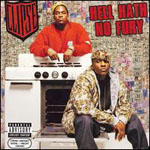
2 :: Clipse
Hell Hath No Fury
(Jive)
Wha…? I’m writing the Top 3 minus 1? So, if Fox Confessor is the ego of my little triptych drama, and Roots & Crowns the superego, guess who gets to play the id? (Our number one can skirt all three.)
Hell Hath No Fury shouldn’t be at number two, what? It came out in late November, which means we have got to be on some sweet honeymoon shit to place it this high. It’s a valid criticism, and I’ve been vocal about my reservations. On the other hand, this totally should be at number two — it deserves it — and even if it has been knee jerked so high on the list, the same result would have been achieved through careful consideration, right?
‘Magin! Because there’s the face of this shit; the sheer harrowing girth of it; the giant nasty sweltering slap in the face of it. This album doesn’t make me schizophrenic; I’m not dividing myself in two to reconcile the hip hop fan who sees this as a fucking smack down and the (quoth Dom) “cold-hearted Marxist” (but really, more precisely, queer theorist and left historian) who doesn’t want to and won’t swallow the misogyny and homophobia of this album whole. Why? This fantasy — and all of its wicked fingers — flies by so fast that it’s hard to see as anything other than a fabulous tragedy, or perhaps it’s just tragically fabulous: we live hard, die young, and never turn into Mick Jagger. Or, alternatively, sometimes I just think Pusha and Malice are so damn cute swaggering their Ps and Qs about that I’ll dot their Is and cross their Ts for them. We’re all adults here, and just because “Dirty Money” is fun doesn’t make anything they say in it true.
Well, okay — I’m a little conflicted. I mean, cranked over lesser beats I’d probably file these dudes in the “mildly offensive” B-list, which is exactly why Lord Willin’ was such a frustrating and rewarding album — you had to sift for the best tracks (other than “Grindin’,” obviously); you had to work for it. Here, the Neptunes drop about a million tons of shit on me, all of it smelling like roses, all of it blooming like solar eclipses inside my head, all of it winding thin metal threads through my flesh to prepare my body for the next millenium, which started the day this tar flare was released. Because whether my fellow nerds want to admit it or not, this is also one of 2006’s most experimental offerings; I mean, this shit is like what Sgt. Pepper’s Lonely Hearts Club Band was to rock (and yes, this is the second album I’ve compared to the Beatles on this list, but it’s been that kind of year for me). It isn’t just a brilliant advancement of the genre — it’s a whole set of new clothes, new ideas, and new boundaries. It’s incendiary.
In fact, here’s the only difference: did everybody forget about Clipse? This thing only sold 78,000 in the first week! But that’s also awesome, right? Because Clipse were never stars to begin with, really; here they put out their masterpiece, which actually defies commercial accessibility, and — lo and behold — it’s all about how commercially accessible they are (in any market). If you build it, they will come, right? Not according to Clipse. They totally think that if they mention they want it built, we’ll do it for them. Even with all my caveats, they’re probably right. That is, after all, how your id rolls.
Mark Abraham

1 :: Subtle
For Hero : For Fool
(Lex/Astralwerks)
With another year comes another job, another eight-hour day punctuated by another cast of characters feeding into the safety of archetype. Another title for another business card, tagged with “assistant” at the end, relegating another desk area to the status of ancillary to a much bigger, cleaner desk. Another computer program to learn, another desktop image to find, another stack of papers to pick apart and another messenger person to shallowly befriend. This continues, right, and it makes New Years seem all the more superfluous, alcohol all the more medicinal, Fight Club and American Psycho references all the more easy and accessible. We’re not treading strange ground here. We’re treading.
For a particular bit of 2006, I worked at an architectural firm in the northeast corner of Chicago’s Chinatown, a short paperclip chain away from the bottom of the Loop. The area is like a composite of alternate realities, two financial and social extremes pressed into each other but barely touching, a concept I learned from the latest Chrismukkah episode of The O.C. Cheap corporate spaces are filling in and renovating the spots between White Castles and Burger Kings, betraying the ugly facades with hyper-modern guts, intricate alarm systems, and fear in the heart of every white female that decides to walk the two short blocks to the CTA station. Cold, I know: but around here, in this Limbo before the South Side, white people tell themselves they are targets, plain and simple.
Three weeks ago (which, by the standards of Internet perpetuity, means whogivesafuck-ago), a homeless man I got to know as Willy Horton sold a trash bag of vinyl LPs to me. Turned out a hilarious grab bag, wandering from mint condition Gap Mangione to scratched Ann Peebles, waterlogged LL Cool J, warped Dave Brubeck, Kenny Rogers snapped in two, Bootsy Collins hailing from the gusty peak of a far off mountain, Diana Ross sweating, Grandmaster Flash posing, George Benson Breezin’, the Force M.D.’s straight Chillin’; to Al Green painted by Bob Ross, the Saturday Night Fever soundtrack permanently swathed in must, Lily Tomlin proving that she put out at least two comedy albums, the Police proving that Synchronicity will never, ever die, and groups like 9.9 or Bar-Kays proving that taste is only as solid as one’s jheri curl and only as virile as one group’s matching fur coats. Every other day, Willy — whose name I’m including here for the sake of it, logging it somewhere — brought me records, and I gave him a few bucks, until he stopped bringing records and simply began to ask me for “help.” Today, as I’ve been writing this, Willy tells me he thinks he has pneumonia, so I give him a few bucks to get to the hospital.
I’m no hero, and most of my charity (that’s what it is, the worst connotation of the word) is bent on guilt. Turns out, I can support myself well as an office underling, which, growing up in the suburbs of Detroit, is what middleclass white kids are supposed to do. Kinda. The first goal is to realize the guilt inherent in this, and the next goal is to overcome that. Immaturity, I mean probably, just comes from never getting rid of that guilt.
For Hero : For Fool is, as can be expected, a dreamscape: cinematic, difficult, abstract and instinctual, studied, base, a masterpiece maybe, but most of all, addled with guilt. Lyricist Dose One doesn’t trouble in traditional storytelling, but Subtle never loses sight of logical threads, adorning the mythoi of their debut A New White (2004) with sequel sparks, doubling the ante, tripling the risks taken, and reaching “The End” like any other journey. But they do it louder than anyone else, they do it barely audibly, wrapped in ambience, and Dose intones choice in transcendence. If, like Chet and Aaron have implied, this album’s a kind of Passion and ultimate sacrifice, then even Dose knows his choice is an illusion. But the reality of that is left for album 3; the middleclass have hopeless years to tread before something breaks, if it ever does. As the man says in “Middleclass Kill,” “This is no joke… / They can see themselves at 50 and are not psychic.”
But For Hero : For Fool isn’t a masterpiece for the white middle, and it sure isn’t CMG’s number one because of guilt. Granted, shit piles on Subtle like sugar in a Dunkin Donuts cup of coffee, and buying the album doesn’t divorce the act of purchase from the conceit that, somehow, the band is being given a hand. When’s the last time I’ve bent at one knee like this? This album is just, well, fucking amazing. Even in details, if the whole is anything but their collusion, which it doesn’t have to be, but I’m talking the buzz saw backwash of troll bass during “Nomanisisland,” before gracious twinkles and strings hang Darwin’s bones on a meat hook where once they were hung on billions of vocal tracks, horns, or maybe not hung, but submerged with electric guitar, a guitar with a clutch that’s grinding gears so hard they go backwards. I’m talking the breathless blink after a saxophone, “The Mercury Craze,” pop and buckle, pop and not pop, a fizz of cheerleading synths talking a new language about the commodification of the body. And then “DANCE,” jittered, that’s “Bed to the Bills,” portentous but scribbled with some aimless chalkboard nails, and by the time the song’s mutated into a pulsing high-end of Doses conversing by yelling at each other, I’m questioning the chalkboard and the nails again, convinced one could not exist without the other. Which came first? Fuck it, this album’s my Lisbon. I can’t stop, because I’ll have to start over.
Easy to describe the layers, easier to map the album as a confluence of samples both recognizable and esoteric, of genres, from hip-hop to rock to soul to funk to R&B to twee to drone to metal to punk to comedy to cacophony, and easiest to think of many of these genres as banned from someone like me as a matter of upbringing; no, as a matter of guilt. Really, For Hero : For Fool is, I think, CMG’s number one because it’s tentacular, because every other pick on the list can sprawl from its bowels or share in its bounty, and the suction cups leave big dinnerplate scars. And because the assimilation is a matter of survival, or just of maturity, which, when it comes to this middleclass “no gamble grind,” is probably survival anyway. It’s a masterpiece in pieces, an albatross of fettered bliss, an absorbing suite of songs so aware of its methods that a place like CMG can’t help but relate.
My point is simple, Dear Reader, even condescending: don’t beat yourself up. Expectations are a bitch, but so is Dose’s voice, and so are Jel’s drums, and so is trying to get a grasp on the breadth of this thing. In pieces, bestways, or maybe in keeping its ground from the footpath. That’s the ticket. The last thing anyone wants is to get burned out on something so gloriously…fat. I mean, what was that American standard we seem to have forgotten so long ago? This is no joke, but I dunno. Something about treading.





